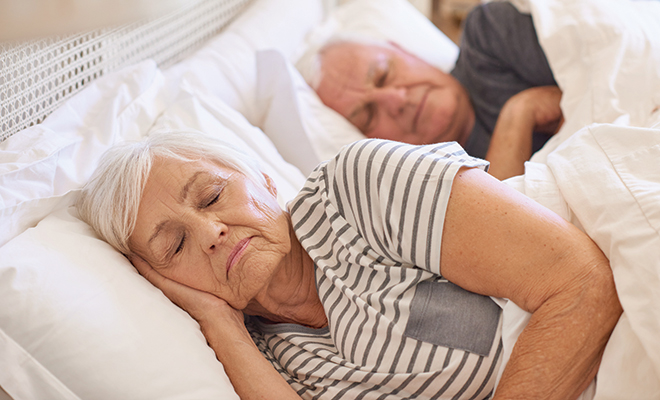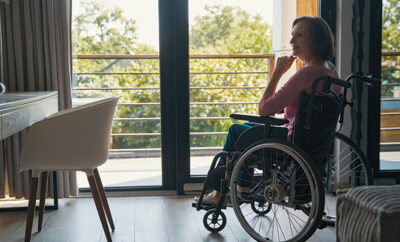
Aging and Sleep
Do you ever feel as if you don’t get enough sleep? Do you even remember what it’s like to sleep through the night? While I certainly had my fair share of sleep deprivation throughout college and then later on when I had young kids, I still suffer from this much-needed biologic necessity even into my 50s. What I wouldn’t give for a full night’s rest. Sadly, this could worsen the older I become.
What exactly is sleep? According to my late grandma, who was fond of quoting something she learned clear back in high school, “sleep is that condition of the body in which the normal activity of the nervous system is so far reduced that consciousness is entirely wanting or at an extremely low ebb.” Grandma loved phrase; she was one of the lucky ones when it came to sleeping.
For many seniors, however, sleeping is not something that comes readily or in large doses. In fact, insomnia and disrupted sleep in older people are common side effects caused by a variety of chronic medical conditions, such as arthritis, depression, congestive heart failure, restless leg syndrome and gastroesophageal reflux disorder. Further, respiratory disorders, such as sleep apnea, can cause numerous arousals during the night and are more common as people age.
Unfortunately, sleep disturbances in older adults frequently go undiagnosed or are left untreated because many people think sleep problems are just a normal part of aging and that nothing can really be done to remedy the situation. However, when the underlying medical disorders are treated, sleep can dramatically improve.
Less able to maintain sleep than their younger counterparts, the elderly suffer disproportionately from chronic sleep deprivation, which may cause one to nod off during daytime activities. Something as simple as a late afternoon nap can reduce one’s ability to sleep through the night, giving rise to increased bouts of insomnia. Not only do seniors have to deal with physical changes as they get older, they are confronted with changes to their sleep patterns. They may have a harder time falling asleep and more trouble staying asleep than when they were younger. Contrary to popular belief, sleep needs do not decline with age. In fact, sleep needs remain constant throughout one’s adult life.
As we sleep, we go through various stages, including dreamless periods of light sleep and deep sleep, along with REM (rapid eye movement) sleep in which we are in active states of dreaming. This sleep cycle is repeated throughout the night. However, older people tend to spend more time in the lighter stages of sleep than in the much-needed deeper stages of sleep.
As we age, there is an overall decline in REM sleep and an increase in sleep fragmentations, during which we awaken many times throughout the night. However, many sleep disturbances at this time in life can be attributed to physical and psychiatric illnesses and even the medications used to treat them.
Other factors affecting sleep in advanced years are the circadian rhythms that coordinate the timing of our bodily functions. You may notice as you get older you become more tired earlier in the evening and perhaps awaken earlier in the morning. In other words, the sleep rhythm has shifted. Seven or eight hours of sleep are still acquired, but the individual awakens quite early as she has gone to bed much earlier.
Then there’s the evil monster insomnia, which is much more prevalent in older adults. This can either be chronic, lasting for more than one month, or acute, lasting just a few days or weeks. Another disruptor of sleep comes in the form of snoring. Certainly younger folks may snore, especially those who are overweight, but the condition usually worsens with age. Loud snoring is serious and can be a symptom of obstructive sleep apnea. This is also associated with high blood pressure and other health issues.
Do you find yourself troubled by restless legs syndrome? It’s another player in the lack of sleep department for older adults. This neurological movement disorder is characterized by an irresistible urge to move your limbs. It becomes worse in the evening and can make it difficult to sleep through the night. Its prevalence tends to increase with age, and it has been suggested 45 percent of all older people have at least a mild form of periodic limb movement disorder.
A few ways to combat sleep disorders include getting more exercise at the appropriate times, adjusting your diet, eliminating and/or reducing alcohol consumption, and treating any underlying issues that may be contributing to your lack of sleep. It is best to discuss your sleep issue concerns with your doctor, who should be able to help you develop strategies to get you the sleep you deserve. ■
Sources: healthysleep.med.harvard.edu, psychologytoday.com and sleepfoundation.org.







